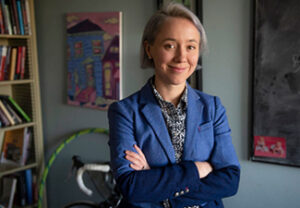
2024 Jerome S. Simon Lectures (Cailin O’Connor, California, Irvine)
Tuesday September 24, 2024, 3:00 pm - Thursday September 26, 2024, 5:00 pm
Event Navigation

We are pleased to announce Cailin O’Connor as our esteemed speaker for the 2024 Jerome S. Simon Lectures. Dr. O’Connor, a professor in the Department of Logic and Philosophy of Science at the University of California, Irvine, works in the philosophy of biology and behavioral sciences, the philosophy of science more generally, and in evolutionary game theory. Her books include Modeling Scientific Communities (Cambridge University Press, 2023); The Misinformation Age: How False Beliefs Spread (Yale University Press, 2020; with James Owen Weatherall); Games in the Philosophy of Biology (Cambridge University Press, 2020); and The Origins of Unfairness: Social Categories and Cultural Evolution (Oxford University Press, 2019).
Please check back at a later date for the lecture details.
About the Simon Lectures
One of the department’s several endowed lecture series, the Jerome S. Simon Lectures are a biennial series of colloquia given by a philosopher of international distinction. After a brief hiatus, we are thrilled to reinvigorate the series in 2021. Past Simon lecturers have included David Velleman (Michigan), David Wiggins (Oxford University), Anil Gupta (Pittsburgh), Barbara Herman (UCLA), John Campbell (UC-Berkeley), Donald Rutherford (UC-San Diego), Jennifer Hornsby (Birkbeck, London), Samuel Scheffler (NYU), Holly M. Smith (Rutgers), and Rainer Forst (Goethe University, Frankfurt).
SHARE